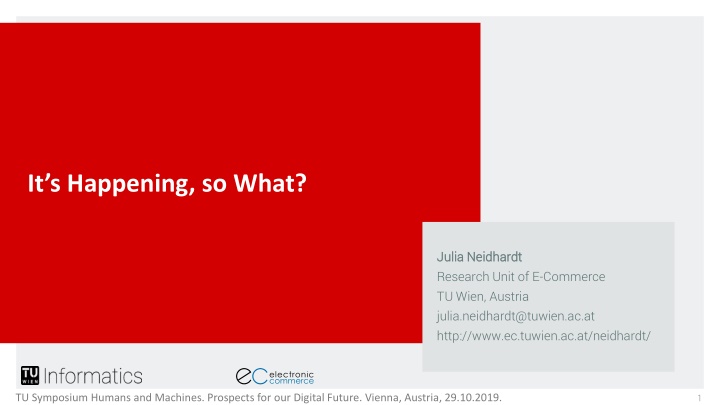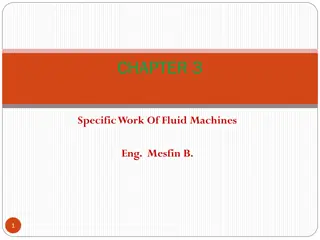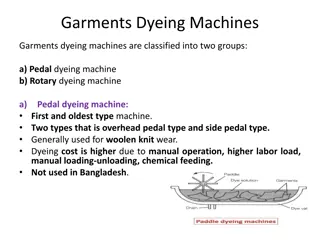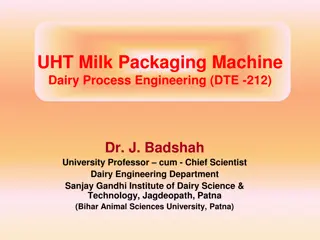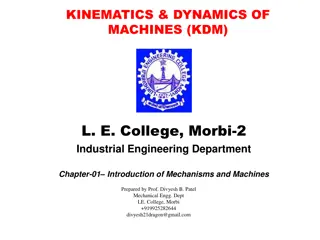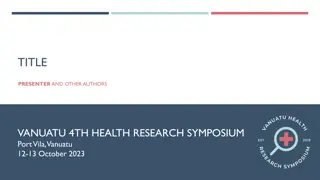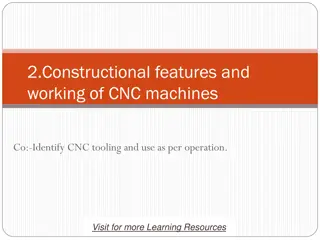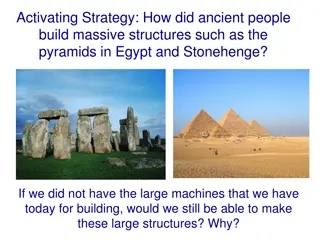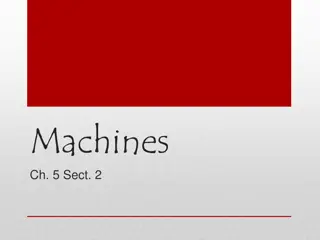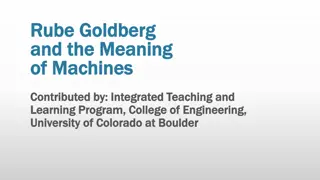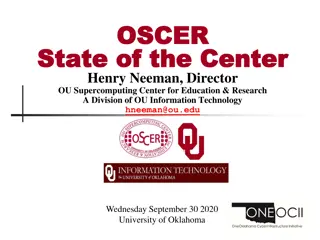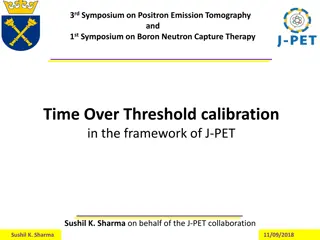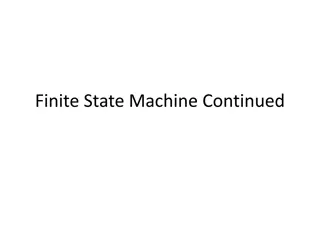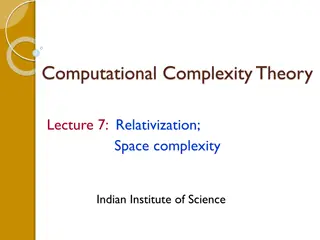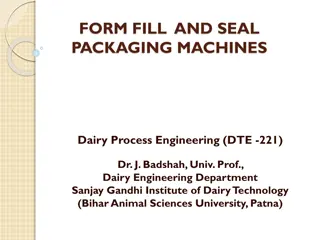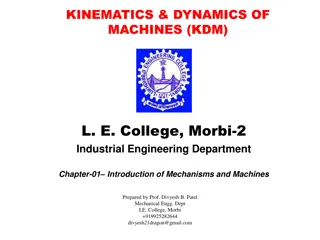TU Symposium Humans and Machines: Prospects for Our Digital Future
Julia Neidhardt from the Research Unit of E-Commerce at TU Wien in Austria presented at the TU Symposium Humans and Machines in Vienna, discussing the pervasive role of informatics in digital transformation, the impact of artificial intelligence, and critical issues like personalization and concentration in the web. Topics covered included the metamorphosis from computers to global machines, the automation of work and decision-making through AI, and the importance of understanding the long-term effects of technology.
Download Presentation

Please find below an Image/Link to download the presentation.
The content on the website is provided AS IS for your information and personal use only. It may not be sold, licensed, or shared on other websites without obtaining consent from the author.If you encounter any issues during the download, it is possible that the publisher has removed the file from their server.
You are allowed to download the files provided on this website for personal or commercial use, subject to the condition that they are used lawfully. All files are the property of their respective owners.
The content on the website is provided AS IS for your information and personal use only. It may not be sold, licensed, or shared on other websites without obtaining consent from the author.
E N D
Presentation Transcript
Its Happening, so What? Julia Neidhardt Julia Neidhardt Research Unit of E-Commerce TU Wien, Austria julia.neidhardt@tuwien.ac.at http://www.ec.tuwien.ac.at/neidhardt/ 1 TU Symposium Humans and Machines. Prospects for our Digital Future. Vienna, Austria, 29.10.2019.
Informatics Digital transformation Digital transformation shows pervasive role of Informatics Important for innovation, growth and wealth Informatics has direct impact on (nearly) everything Foundational methods and artefacts Metamorphosis from a computer to global machine And every thing thing touched by Software becomes a Computer 2 TU Symposium Humans and Machines. Prospects for our Digital Future. Vienna, Austria, 29.10.2019.
Informatics (2) Artificial Intelligence/Machine learning is automating working and decision making Discussions between Utopia and Dystopia Utopia and Dystopia Neural networks as current paradigm of AI: Roy Amara (ITF's president) with his law : We tend to overestimate the effect of a technology in the short run We tend to overestimate the effect of a technology in the short run and underestimate it in the long run and underestimate it in the long run Many AI summers and winters since 50s Current boom required related technology stack: processing power, memory, available/accessible data 3 TU Symposium Humans and Machines. Prospects for our Digital Future. Vienna, Austria, 29.10.2019.
Many Critical Issues Personalization Personalization Ubiquitous and absolutely required to counteract information overload Implicit personality acquisition Implicit personality acquisition: By analyzing user behavior and user generated content, it is possible to gain deep knowledge about a user even about the user s personality ( Big Five traits) Micro-blogs (Twitter) Social media (Facebook, Weibo) Games Mobile phone logs Stereotypical stories Selected pictures High danger of misuse (remember Cambridge Analytica!) Big Five traits: Big Five traits: O Openness to experience C Conscientiousness E Extraversion A Agreeableness N Neuroticism (Tkalcic & Chen 2015, Neidhardt et al. 2014) 4 TU Symposium Humans and Machines. Prospects for our Digital Future. Vienna, Austria, 29.10.2019.
Many Critical Issues (2) Concentration and monopolies in the Web Crucial in economic, political and even military conflicts, even autonomous weapons Echo chambers and fake news (will social media become 5. power?) Privacy Automation and work The system is failing The system is failing, stated by Tim Berners-Lee The Internet apologizes The Internet apologizes, Jaron Lanier, a pioneer in virtual reality In April 2019 Vienna Workshop on Digital Humanism (www.informatics.tuwien.ac.at/dighum) 5 TU Symposium Humans and Machines. Prospects for our Digital Future. Vienna, Austria, 29.10.2019.
Which Way to Go? 4th Industrial Revolution vs. Surveillance Capitalism 6 TU Symposium Humans and Machines. Prospects for our Digital Future. Vienna, Austria, 29.10.2019.
Workshop on Digital Humanism More than 100 participants, from Informatics, Philosophy, History, Anthropology, Law, Economics, Political Science, Mathematics, Sociology Three main sessions: History and Impact of Information Technology Humans and Society, AI and Ethics Dynamics of a New World Issues and Answers Presentations at website www.informatics.tuwien.ac.at/dighum 7 TU Symposium Humans and Machines. Prospects for our Digital Future. Vienna, Austria, 29.10.2019.
Vienna Manifesto on Digital Humanism The manifesto is a call for reflection and action call for reflection and action (addressed to science and decision makers), and it is also a research program research program We should shape technologies in accordance with human values and needs instead letting technologies shape us Some core principles: Digital technologies should be designed to promote democracy and inclusion Fairness, responsibility and transparency Fairness, responsibility and transparency of software programs and algorithms Action/intervention against tech monopolies against tech monopolies Decisions affecting human rights must be made by humans Decisions affecting human rights must be made by humans The connection of different scientific disciplines is essential Universities Universities create new knowledge and enhance critical thinking; they have a particular responsibility responsibility Academic and industrial researchers must maintain an open dialogue with society Academic teaching needs to combine humanities, social sciences and engineering combine humanities, social sciences and engineering promote democracy and inclusion have a particular open dialogue with society 8 TU Symposium Humans and Machines. Prospects for our Digital Future. Vienna, Austria, 29.10.2019.
Impact Manifesto more than 600 signatures (42 countries) and 6 language versions Research program in Vienna Featured in major Greek newspaper Kathimerini Kathimerini 9 TU Symposium Humans and Machines. Prospects for our Digital Future. Vienna, Austria, 29.10.2019.
Impact (2) DigHum DigHum lecture at TU Wien / Informatics lecture at TU Wien / Informatics Interactive lecture with presentations, discussions and group work of students Each group has an advisor / mix of disciplines (incl. philosophy) Students deliver a final report / SW and publish their results on the web Combined with a public lecture series with internationally renowned speakers (https://informatics.tuwien.ac.at/stories-1758) 06.11.2019 06.11.2019 Susan J. Winter Susan J. Winter (University of Maryland) Cui Bono: A Sociotechical View of Smart Cities 20.11.2019 20.11.2019 Gerfried Gerfried Stocker Stocker (Artistic Director of Ars Electronica) Humanizing Technology through Arts 18.12.2019 Edward A. Lee 18.12.2019 Edward A. Lee (University of California at Berkeley) The Coevolution of Humans and Machines 08.01.2019 Julian Nida 08.01.2019 Julian Nida- -R melin R melin ( (Ludwig-Maximilians-Universit t Munich) Digitaler Humanismus 10 TU Symposium Humans and Machines. Prospects for our Digital Future. Vienna, Austria, 29.10.2019.
Conclusions Technology is not magic, it does not come from nowhere Reflects specific interests and points of view Need to understand and to reflect But we can and must actively participate Doing research in this field also implies a specific responsibility We are at a crossroads Popper (1969) Moral Responsibility of the Scientist http://www.unz.com/print/Encounter-1969mar-00052 11 TU Symposium Humans and Machines. Prospects for our Digital Future. Vienna, Austria, 29.10.2019.
Thank you! 12 TU Symposium Humans and Machines. Prospects for our Digital Future. Vienna, Austria, 29.10.2019.
